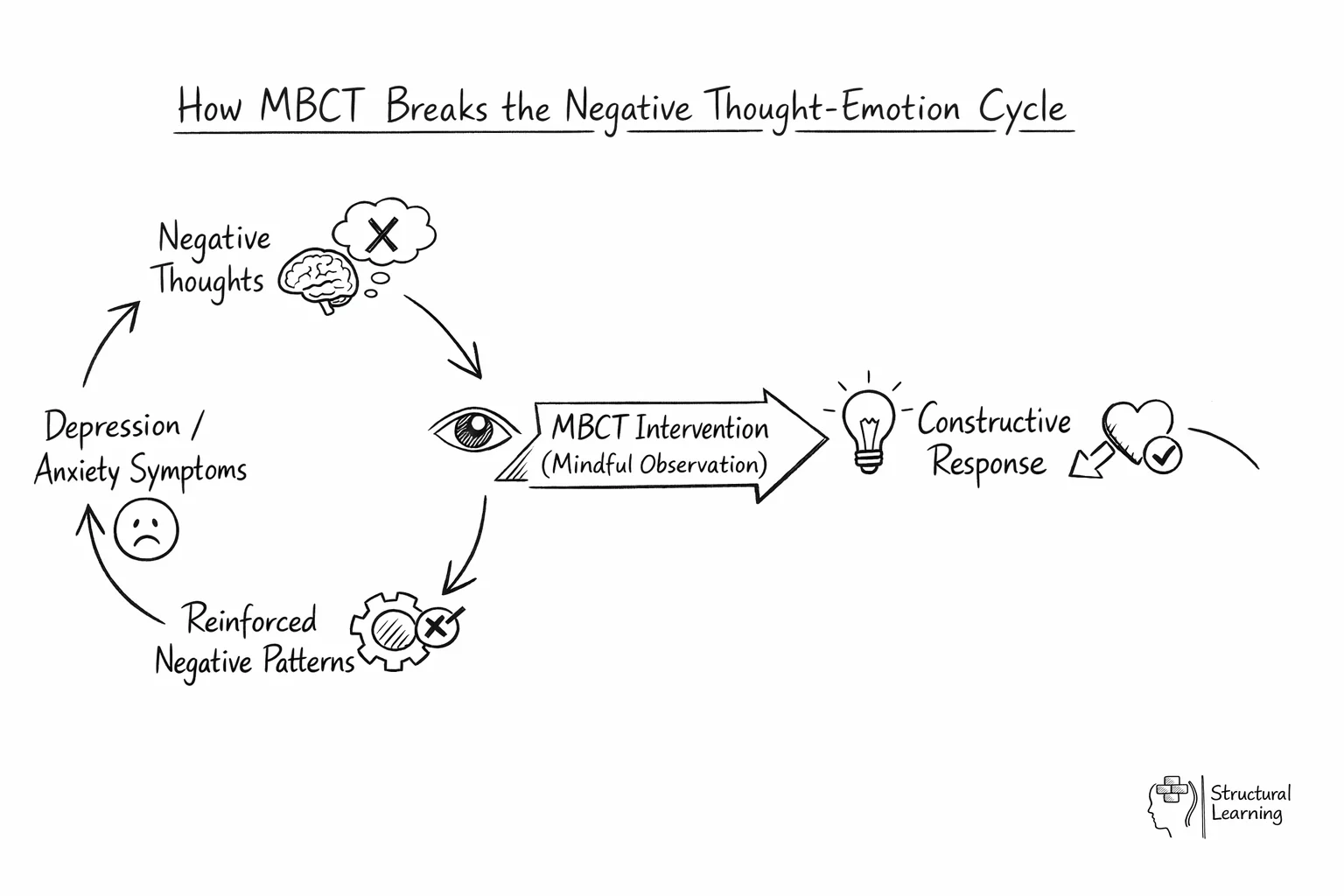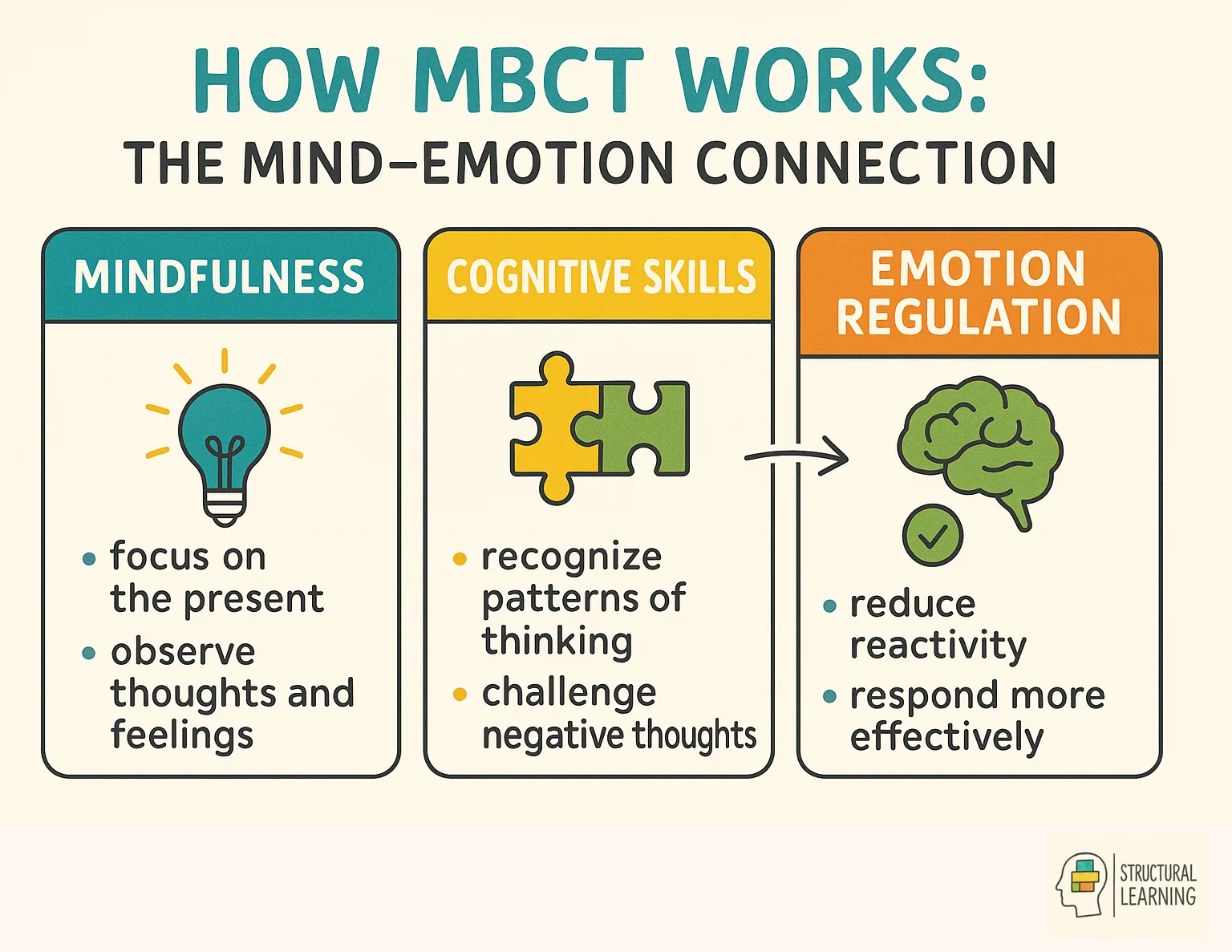Mindfulness-Based Cognitive Therapy
Explore Mindfulness-Based Cognitive Therapy (MBCT), a blend of cognitive therapy and mindfulness practices for managing depression and anxiety.


Explore Mindfulness-Based Cognitive Therapy (MBCT), a blend of cognitive therapy and mindfulness practices for managing depression and anxiety.
Mindfulness-Based Cognitive Therapy (MBCT) combines cognitive therapy techniques with mindfulness practices to help individuals identify and change negative thought patterns. It works by teaching people to observe their thoughts and emotions with curiosity rather than judgment, breaking the cycle of recurring depression and anxiety. The approach typically involves weekly sessions teaching mindfulness meditation, body scans, and cognitive restructuring techniques.

Mindfulness-Based Cognitive Therapy (MBCT) is a potent blend of cognitive therapeutic techniques and mindfulness strategies. Initially designed as a therapy for depression, its efficacy has been recognised across a spectrum of mental health disorders.
The crux of MBCT lies in the profound influence our thoughts and emotions exert on our mental health. Negative thought patterns can exacerbate depressive symptoms, ensnaring individuals in a relentless cycle of recurring depressive episodes.

MBCT's unique approach seeks to help individuals identify and alter these detrimental thought patterns.
MBCT encourages the cultivation of a fresh perspective towards thoughts and emotions. Instead of being entangled in negative thoughts, individuals are guided to observe them with curiosity and without judgment. This heightened attention of their thoughts and emotions in the present moment equips individuals with the ability to respond to them in a more constructive and compassionate manner.
MBCT typically involves weekly therapy sessions, where individuals are introduced to a variety of mindfulness techniques. These techniques, which include mindfulness meditation, body scans, and gentle yoga exercises, are designed to be integrated into daily life. This integration creates resilience and equips individuals with the tools to better manage their thoughts and emotions.
A study in the Journal of Consulting and Clinical Psychology found that MBCT reduced the risk of relapse of recurrent depression by 43% compared to individuals who did not receive MBCT.
As the renowned psychologist Jon Kabat-Zinn said, "Mindfulness is the aware, balanced acceptance of the present experience." This acceptance is the cornerstone of MBCT and can significantly enhance the quality of life for individuals grappling with mental health issues.
Key Insights:
Research shows MBCT reduces depression relapse rates by 43% when integrated into pastoral care programs for vulnerable students. Studies demonstrate that combining cognitive restructuring with mindfulness techniques is more effective than mindfulness alone, particularly for pupils experiencing recurring anxiety. The evidence base includes multiple clinical trials showing MBCT's efficacy across various mental health conditions in educational settings.
Mindfulness-Based Cognitive Therapy (MBCT) is grounded in a rich body of theoretical and empirical literature. Here are nine key areas of study and literature that underpin this form of therapy:
The evidence base for MBCT continues to expand, with ongoing research exploring its applications across diverse populations and settings. In educational contexts, studies have shown particular promise for supporting students who experience recurring episodes of low mood or anxiety, making it a valuable addition to school-based mental health interventions.
Educators can implement MBCT techniques through structured programmes that combine brief mindfulness exercises with cognitive restructuring activities. Key approaches include integrating 5-10 minute body scan sessions into pastoral care time, teaching students to identify and challenge negative thought patterns using curiosity-based questioning, and creating classroom environments that support non-judgmental awareness of emotions.
Implementing MBCT in educational settings requires careful adaptation of therapeutic techniques to suit the school environment and student developmental needs. The approach should focus on prevention and early intervention rather than clinical treatment, making it accessible to all students whilst providing additional support for those experiencing difficulties.
Practical implementation strategies include establishing regular mindfulness practice sessions during form time or designated wellbeing periods. These sessions can incorporate simple breathing exercises, brief body scans, and guided awareness activities that help students develop present-moment attention skills. Teachers can model mindful awareness by demonstrating how to notice thoughts and emotions without immediately reacting to them.
Cognitive restructuring elements can be introduced through structured questioning techniques that encourage students to examine their thought patterns. Rather than accepting negative thoughts as facts, students learn to approach them with curiosity, asking questions such as "Is this thought helpful?" or "What evidence supports this perspective?" This approach builds critical thinking skills whilst supporting emotional regulation.
Training for educators is essential for successful implementation. Teachers need to understand both the theoretical foundations of MBCT and practical techniques for age-appropriate delivery. Professional development should include experiential learning, allowing educators to practice mindfulness techniques themselves before introducing them to students.
Mindfulness-Based Cognitive Therapy represents a powerful approach to supporting student mental health and wellbeing in educational settings. By combining the awareness-building aspects of mindfulness with the practical problem-solving techniques of cognitive therapy, MBCT offers educators evidence-based tools for helping students develop resilience and emotional regulation skills.
The research evidence demonstrates that MBCT can significantly reduce the risk of depression relapse and improve outcomes for students experiencing anxiety and low mood. Its emphasis on developing a curious, non-judgmental relationship with thoughts and emotions provides students with lifelong skills for managing mental health challenges. As schools increasingly recognise the importance of wellbeing alongside academic achievement, MBCT techniques offer practical, classroom-ready interventions that can be integrated into existing pastoral care structures.
For educators seeking to support student wellbeing, MBCT provides a structured framework that goes beyond simple relaxation techniques to address the underlying cognitive patterns that contribute to emotional distress. By developing present-moment awareness and teaching students to respond rather than react to difficult thoughts and emotions, MBCT can play a vital role in creating more resilient, emotionally intelligent learning communities.
Mindfulness-based interventions
For educators and researchers interested in exploring MBCT applications in educational settings, the following research papers provide valuable insights:
Mindfulness-Based Cognitive Therapy (MBCT) combines cognitive therapy techniques with mindfulness practices to help individuals identify and change negative thought patterns. It works by teaching people to observe their thoughts and emotions with curiosity rather than judgment, breaking the cycle of recurring depression and anxiety. The approach typically involves weekly sessions teaching mindfulness meditation, body scans, and cognitive restructuring techniques.

Mindfulness-Based Cognitive Therapy (MBCT) is a potent blend of cognitive therapeutic techniques and mindfulness strategies. Initially designed as a therapy for depression, its efficacy has been recognised across a spectrum of mental health disorders.
The crux of MBCT lies in the profound influence our thoughts and emotions exert on our mental health. Negative thought patterns can exacerbate depressive symptoms, ensnaring individuals in a relentless cycle of recurring depressive episodes.

MBCT's unique approach seeks to help individuals identify and alter these detrimental thought patterns.
MBCT encourages the cultivation of a fresh perspective towards thoughts and emotions. Instead of being entangled in negative thoughts, individuals are guided to observe them with curiosity and without judgment. This heightened attention of their thoughts and emotions in the present moment equips individuals with the ability to respond to them in a more constructive and compassionate manner.
MBCT typically involves weekly therapy sessions, where individuals are introduced to a variety of mindfulness techniques. These techniques, which include mindfulness meditation, body scans, and gentle yoga exercises, are designed to be integrated into daily life. This integration creates resilience and equips individuals with the tools to better manage their thoughts and emotions.
A study in the Journal of Consulting and Clinical Psychology found that MBCT reduced the risk of relapse of recurrent depression by 43% compared to individuals who did not receive MBCT.
As the renowned psychologist Jon Kabat-Zinn said, "Mindfulness is the aware, balanced acceptance of the present experience." This acceptance is the cornerstone of MBCT and can significantly enhance the quality of life for individuals grappling with mental health issues.
Key Insights:
Research shows MBCT reduces depression relapse rates by 43% when integrated into pastoral care programs for vulnerable students. Studies demonstrate that combining cognitive restructuring with mindfulness techniques is more effective than mindfulness alone, particularly for pupils experiencing recurring anxiety. The evidence base includes multiple clinical trials showing MBCT's efficacy across various mental health conditions in educational settings.
Mindfulness-Based Cognitive Therapy (MBCT) is grounded in a rich body of theoretical and empirical literature. Here are nine key areas of study and literature that underpin this form of therapy:
The evidence base for MBCT continues to expand, with ongoing research exploring its applications across diverse populations and settings. In educational contexts, studies have shown particular promise for supporting students who experience recurring episodes of low mood or anxiety, making it a valuable addition to school-based mental health interventions.
Educators can implement MBCT techniques through structured programmes that combine brief mindfulness exercises with cognitive restructuring activities. Key approaches include integrating 5-10 minute body scan sessions into pastoral care time, teaching students to identify and challenge negative thought patterns using curiosity-based questioning, and creating classroom environments that support non-judgmental awareness of emotions.
Implementing MBCT in educational settings requires careful adaptation of therapeutic techniques to suit the school environment and student developmental needs. The approach should focus on prevention and early intervention rather than clinical treatment, making it accessible to all students whilst providing additional support for those experiencing difficulties.
Practical implementation strategies include establishing regular mindfulness practice sessions during form time or designated wellbeing periods. These sessions can incorporate simple breathing exercises, brief body scans, and guided awareness activities that help students develop present-moment attention skills. Teachers can model mindful awareness by demonstrating how to notice thoughts and emotions without immediately reacting to them.
Cognitive restructuring elements can be introduced through structured questioning techniques that encourage students to examine their thought patterns. Rather than accepting negative thoughts as facts, students learn to approach them with curiosity, asking questions such as "Is this thought helpful?" or "What evidence supports this perspective?" This approach builds critical thinking skills whilst supporting emotional regulation.
Training for educators is essential for successful implementation. Teachers need to understand both the theoretical foundations of MBCT and practical techniques for age-appropriate delivery. Professional development should include experiential learning, allowing educators to practice mindfulness techniques themselves before introducing them to students.
Mindfulness-Based Cognitive Therapy represents a powerful approach to supporting student mental health and wellbeing in educational settings. By combining the awareness-building aspects of mindfulness with the practical problem-solving techniques of cognitive therapy, MBCT offers educators evidence-based tools for helping students develop resilience and emotional regulation skills.
The research evidence demonstrates that MBCT can significantly reduce the risk of depression relapse and improve outcomes for students experiencing anxiety and low mood. Its emphasis on developing a curious, non-judgmental relationship with thoughts and emotions provides students with lifelong skills for managing mental health challenges. As schools increasingly recognise the importance of wellbeing alongside academic achievement, MBCT techniques offer practical, classroom-ready interventions that can be integrated into existing pastoral care structures.
For educators seeking to support student wellbeing, MBCT provides a structured framework that goes beyond simple relaxation techniques to address the underlying cognitive patterns that contribute to emotional distress. By developing present-moment awareness and teaching students to respond rather than react to difficult thoughts and emotions, MBCT can play a vital role in creating more resilient, emotionally intelligent learning communities.
Mindfulness-based interventions
For educators and researchers interested in exploring MBCT applications in educational settings, the following research papers provide valuable insights:
{"@context":"https://schema.org","@graph":[{"@type":"Article","@id":"https://www.structural-learning.com/post/mindfulness-based-cognitive-therapy#article","headline":"Mindfulness-Based Cognitive Therapy","description":"Explore Mindfulness-Based Cognitive Therapy (MBCT), a blend of cognitive therapy and mindfulness practices for managing depression and anxiety.","datePublished":"2023-07-20T10:40:58.402Z","dateModified":"2026-01-26T10:09:32.212Z","author":{"@type":"Person","name":"Paul Main","url":"https://www.structural-learning.com/team/paulmain","jobTitle":"Founder & Educational Consultant"},"publisher":{"@type":"Organization","name":"Structural Learning","url":"https://www.structural-learning.com","logo":{"@type":"ImageObject","url":"https://cdn.prod.website-files.com/5b69a01ba2e409e5d5e055c6/6040bf0426cb415ba2fc7882_newlogoblue.svg"}},"mainEntityOfPage":{"@type":"WebPage","@id":"https://www.structural-learning.com/post/mindfulness-based-cognitive-therapy"},"image":"https://cdn.prod.website-files.com/5b69a01ba2e409501de055d1/69523eb15afeea63984d515e_69523eaec2775f7e24ffd2df_mindfulness-based-cognitive-therapy-infographic.webp","wordCount":3204},{"@type":"BreadcrumbList","@id":"https://www.structural-learning.com/post/mindfulness-based-cognitive-therapy#breadcrumb","itemListElement":[{"@type":"ListItem","position":1,"name":"Home","item":"https://www.structural-learning.com/"},{"@type":"ListItem","position":2,"name":"Blog","item":"https://www.structural-learning.com/blog"},{"@type":"ListItem","position":3,"name":"Mindfulness-Based Cognitive Therapy","item":"https://www.structural-learning.com/post/mindfulness-based-cognitive-therapy"}]}]}